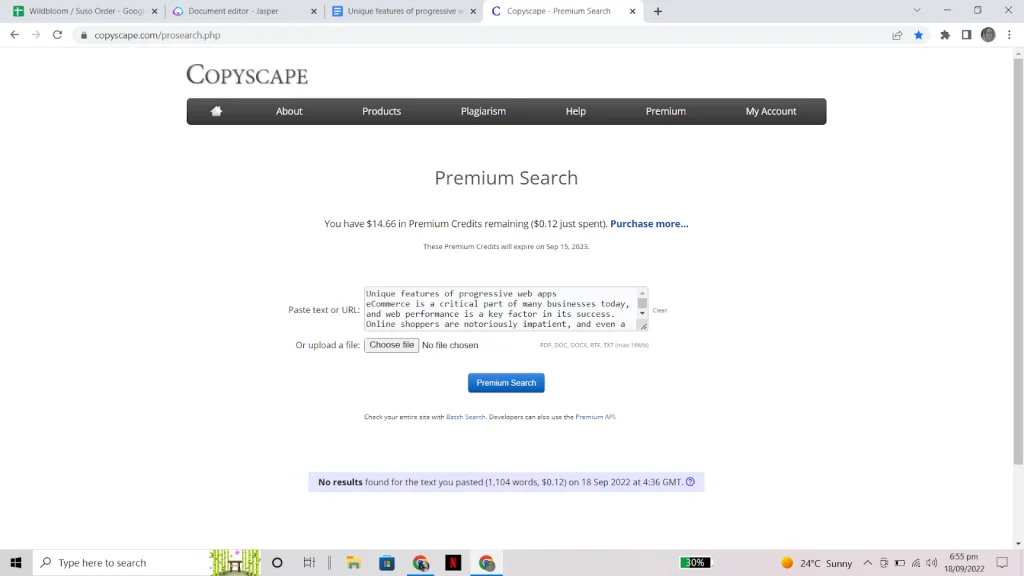Unique features of Progressive Web Apps

In today’s business landscape, E-Commerce relies heavily on web performance. Progressive web apps (PWAs) are pivotal, ensuring swift page loading to captivate impatient online shoppers. A delay can cost sales, impact SEO, and diminish visibility, underscoring the need for optimal web performance.
Therefore, it is essential to ensure that your eCommerce website is as fast and responsive as possible. There are several key factors that contribute to web performance, including server response time, page size and complexity, and third-party scripts. By optimizing these elements, you can dramatically improve your website’s speed and overall user experience.
Progressive web apps are becoming increasingly popular for eCommerce businesses due to their many advantages, especially their super-fast and responsive performance. In this article, we will take an in-depth look at all the features that make progressive web apps so popular.
What is a Progressive Web App?
A Progressive Web App (PWA) is a type of application software that combines the best of both web and native apps. PWAs are built using common web technologies such as HTML, CSS, and JavaScript. They are delivered through a website but look and feel like a native app.
- JavaScript is a programming language that is mainly used in web development. It enables developers to create dynamic and interactive websites. JavaScript is also used in server-side programming, game development, and mobile app development.
- HTML is the standard markup language for creating web pages and web applications. With HTML, you can create your own website.
- CSS (Cascading Style Sheets) is a style sheet language used for describing the presentation of a document written in a markup language. A style sheet is a set of rules that tell a web browser how to display a document written in HTML or XML.
PWAs offer a number of advantages over traditional web apps and native apps. They are more reliable, faster, and engaging. As they utilize standard web technologies, any platform supporting these technologies can easily deploy them.
There are a number of ways to create a PWA. One popular method is to use a framework such as React or AngularJS. Another option is to use a tool like Google’s Workbox.
While PWAs are still a relatively new technology, they are already being used by some of the biggest and renowned names in the tech industry, including Google, Facebook, Twitter, and Pinterest. As more browsers and devices begin to support them, it’s likely that we’ll see an even more widespread adoption of PWAs in the near future.
Features of a PWA
Designing to resemble native mobile apps, progressive web apps actively provide the look and feel of seamless web applications. They offer a number of benefits over traditional web apps, including better performance, offline functionality, and increased engagement.
Some of the key progressive web app features include:
- Better Performance: Progressive web apps are built using modern web technologies such as service workers and app shells. This results in apps that are much faster and more responsive than traditional web apps.
- Offline Functionality: Progressive web apps can function even when there is no internet connection available. This is possible due to the use of service workers, which allow for caching of resources offline.
- Increased Engagement: Progressive web apps can be added to the home screen of a user’s device, making them easily accessible. This can lead to increased engagement with the app as users are more likely to return to it.
- Push Notifications: Progressive web apps can send push notifications to users, even when the app is not open. It enables the delivery of timely and relevant information directly to users, regardless of their location.
- Home Screen Shortcuts: Progressive web apps can also create shortcuts on the home screen of a user’s device. This makes it even easier for users to access the app and explore its features.
Progressive web apps offer a number of benefits over traditional web apps. By taking advantage of modern web technologies, they are able to provide a better user experience that is faster, more responsive, and more engaging. If you’re looking to create a web app that provides a truly native experience, then progressive web apps are the way to go.
Benefits of using PWAs in eCommerce
One of the main advantages of progressive web apps is that they offer a native app-like experience without the need to download and install a separate app. This means that users can enjoy all the benefits of using a native app without taking up valuable space on their devices.
Another key advantage is that they are much easier and cheaper to develop than traditional native apps. This is because there is no need to create separate versions for different platforms, such as iOS and Android. Instead, a single progressive web app can work across all platforms.
Progressive web apps surpass traditional web apps in reliability as they cache and remain usable offline. Even with a lost internet connection, users can still access the app and utilize its features.
How composable commerce and PWAs work together to improve web performance
Businesses use the term ‘composable commerce’ to depict a novel approach in constructing digital commerce experiences. It is based on the idea of assembling individual components – or microservices – to create a complete experience rather than relying on a single, monolithic platform.
This approach has many benefits, including increased flexibility, faster time-to-market, and improved performance. And when combined with progressive web applications (PWAs), composable commerce can further improve web performance by taking advantage of modern web technologies.
PWAs leverage standard web technologies like HTML, CSS, and JavaScript to create websites with a native app look and feel. They aim to deliver speed, reliability, and engagement, even in uncertain network conditions. As PWAs leverage web technologies, businesses can seamlessly integrate them with other web-based systems, like composable commerce platforms.
In a nutshell, composable commerce and PWAs work together to create fast, reliable and engaging digital commerce experiences. And by taking advantage of modern web technologies, they can offer significant performance benefits over traditional monolithic platforms.
Wrapping it up
As you can see, there are many compelling reasons for eCommerce businesses to develop progressive web apps. If you’re looking to improve your online presence and offer a better experience to your users, then a progressive web app may be the perfect solution for you.

Unique features of progressive web apps

